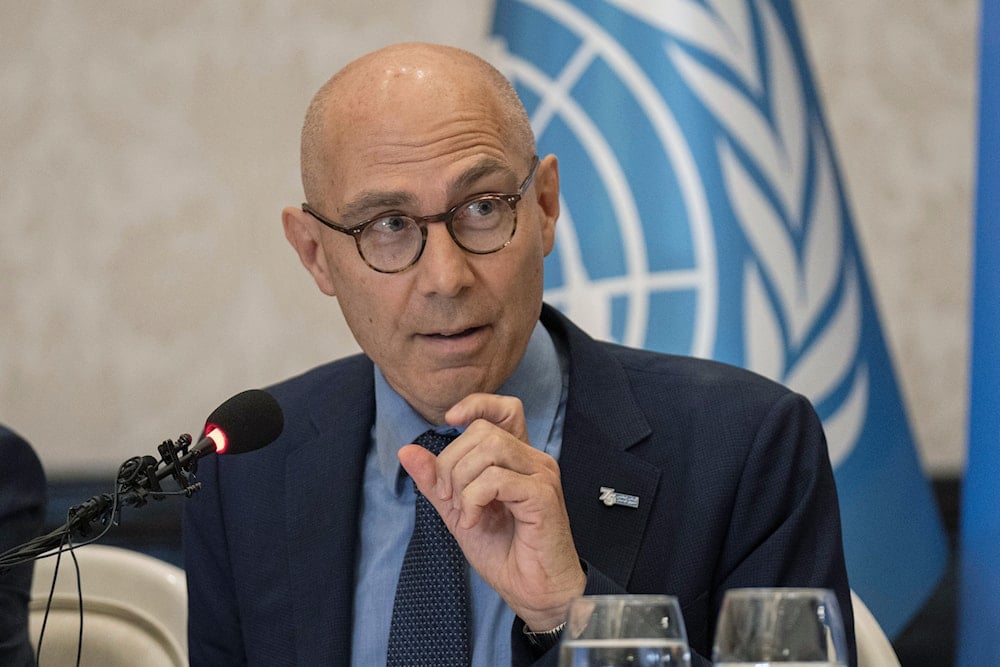Uprising against Volker Turk at the Human Rights Council over Gaza
UN OHCHR staffers urge High Commissioner Volker Turk to formally recognize Israeli actions in Gaza as genocide and ensure accountability, transparency, and cessation of arms support.
-

United Nations High Commissioner for Human Rights Volker Turk speaks during a press conference in Baghdad, Iraq, on August 9, 2023. (AP)
An uprising has erupted within the Office of the United Nations High Commissioner for Human Rights (OHCHR) against High Commissioner Volker Turk, over his refusal, since the beginning of the Israeli aggression on Gaza nearly two years ago, to grant justice to Palestinian victims. Turk has avoided calling "Israel’s" crimes by their actual names and has refrained from using the term “genocide,” despite the International Court of Justice (ICJ) ordering "Israel" to take measures to prevent it.
A total of 517 employees of the office addressed a strongly worded letter to the High Commissioner, demanding that he publicly and explicitly describe the situation as genocide.
However, Turk’s response to the employees’ letter was deeply disappointing to them, as it failed to include even the slightest reference to "Israel’s" crimes under any legal designation.
Employees, who spoke to Al Mayadeen on condition of anonymity, stressed that Turk’s refusal to use accurate terminology for "Israel’s" crimes leads to the dilution of legal responsibility. It also raises serious questions about the office’s commitment to upholding the standards of the Genocide Convention, particularly given that the ICJ has deemed the rights under the Convention “plausible.”
Al Mayadeen obtained a copy of the employees’ letter, as well as Turk’s official reply.
Read more: 'Israel' cuts all ties with OHCHR, not issuing visas for employees
OHCHR staffers denounce silence on Gaza genocide
In their letter, 517 staff members of the Office of the High Commissioner for Human Rights (OHCHR) expressed deep frustration at the UN’s failure to adequately respond to "Israel’s" actions in Gaza. They argued that the situation clearly meets the legal threshold for genocide under international law and urged the High Commissioner to use that term explicitly in public statements.
The staffers criticized the office’s delay in taking a clear stance, saying it has damaged confidence in its leadership. They demanded stronger advocacy, including a public call for states to stop arms sales and logistical or financial support to "Israel", in line with international treaties and human rights obligations.
They also called for an internal review to ensure the OHCHR is not complicit, even indirectly, in violations, and insisted on greater transparency and communication from senior leadership. The letter stressed that the UN has a moral and legal duty to condemn genocide, recalling the organization’s founding mission after World War II and the Holocaust, and warning against repeating the failures of silence during the Rwandan genocide.
The staff pressed for a response that matches the gravity of the situation, one that acknowledges genocide and pushes for accountability, protection of civilians, and unhindered humanitarian aid.
Read more: 1,200+ film figures vow boycott of 'Israel' over Gaza genocide
Turk refuses to directly address genocide in Gaza
In his response on August 28, High Commissioner Volker Turk acknowledged the staff’s concerns but refrained from directly addressing their demand to classify "Israel’s" actions in Gaza as genocide. Instead, he emphasized his recognition of the moral outrage caused by the atrocities and the frustration with the international community’s inaction.
Turk praised the work of OHCHR teams in Palestine and Geneva, highlighting their professionalism and impact, even if not always visible. He underscored the office’s commitment to monitoring, reporting, and advocating for accountability while noting concerns over arms transfers that contribute to violations.
Ultimately, Turk urged staff to remain united, committed to values, and focused on using the OHCHR’s mandate to advance human rights. His letter emphasized solidarity and continued advocacy but fell short of explicitly meeting the staff’s central demand for a legal designation of genocide.
Read more: Majority of young Americans view Israeli war as genocide: Poll

 4 Min Read
4 Min Read










